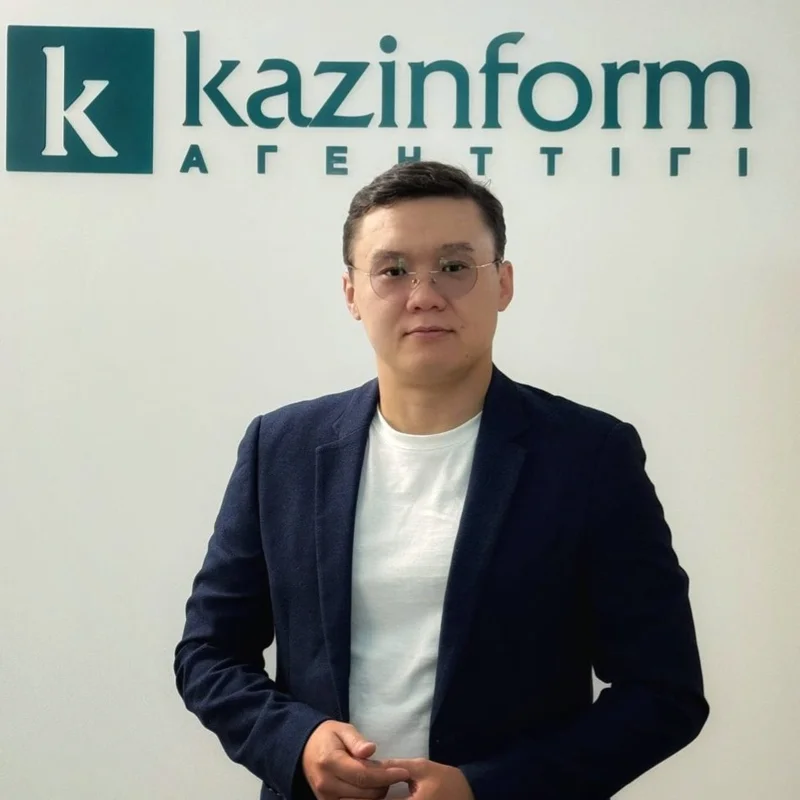From the UN podium to deals with global giants — results of the President of Kazakhstan’s visit to New York
The working visit of the President of Kazakhstan to New York to participate in the 80th session of the UN General Assembly proved extremely productive. It was not only an opportunity to present the country’s position at the global level, but also a good way to attract new investments. The results of the visit are summarized in the material by a Kazinform News Agency correspondent.
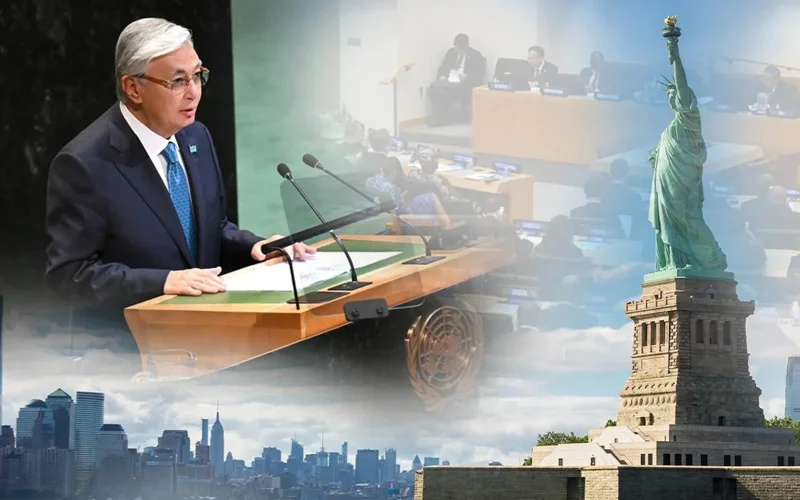
A platform for global dialogue
These days, world media outlets are writing about the heated debates unfolding at the UN. The anniversary session of the General Assembly demonstrates all the contradictions of the modern world and once again raises the issue of reforming the key UN bodies.
Eighty years have passed since the Organization was established. Much has changed during this time. Some provisions of the UN Charter look outdated. In the context of the erosion of international relations, more and more questions arise about the Security Council, which is failing to ensure its main function of maintaining peace and security. Growing contradictions between major powers negatively affect the global economy. Against this backdrop, the voices of middle powers, seeking to maintain balance and strengthen trust in the world, are heard more loudly.
In New York, many political and economic issues have been tightly intertwined. This is the peak of global political activity, and Kazakhstan made maximum use of the negotiating platform. President Kassym-Jomart Tokayev held more than 20 meetings with heads of state, ministers, leaders of international organizations, and major global companies.
During the visit, the President of Kazakhstan emphasized the importance of strategic partnership with the United States, Kazakhstan’s commitment to further developing multifaceted cooperation, and expressed satisfaction that the U.S. also shares this strategic approach.
“We had another substantive conversation with President Trump, for which I am very grateful to him. Kazakhstan highly values President Trump’s leadership in advancing pragmatic diplomacy and promoting peaceful settlement of acute conflicts from Europe and the Middle East to Asia and Africa. His constructive stance and focus on achieving concrete results contribute to reducing tensions and fostering dialogue amid growing global polarization. Such resolute and result-oriented efforts deserve broad international recognition,” the Head of State stressed at a meeting with U.S. business leaders.
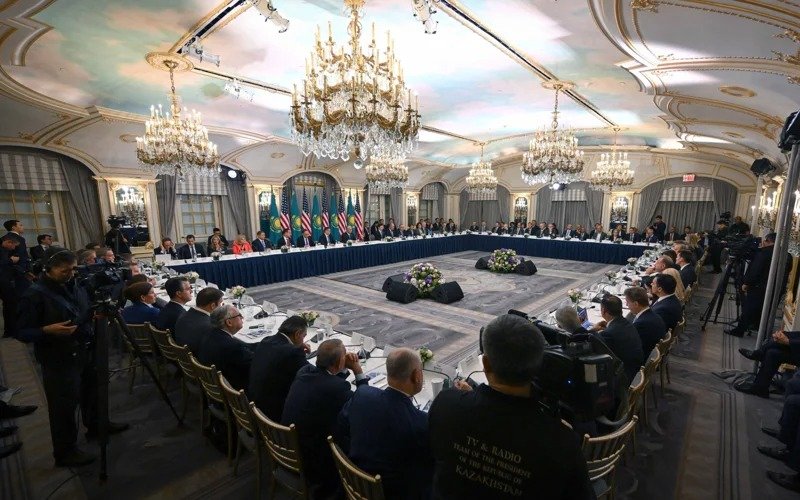
Equally important were meetings with other heads of state, where bilateral and multilateral cooperation issues were discussed, with particular attention paid to the current geopolitical situation. Negotiations were held with the presidents of France, Finland, Montenegro, the prime ministers of Luxembourg and Belgium, the Prince of Monaco, the President of the European Council, and the UN Secretary-General.
At a meeting with the President of Ukraine, issues of bilateral economic and humanitarian cooperation were discussed. Volodymyr Zelensky shared his view of the situation in Ukraine. Kassym-Jomart Tokayev expressed the opinion that in this extremely difficult situation, diplomatic work should continue to find ways to end the conflict.
Dialogue instead of force
The theme of peacekeeping was central in the address of our Head of State at the general debates of the 80th session of the UN General Assembly. Kassym-Jomart Tokayev noted the role of the Organization in addressing humanity’s global challenges, but also pointed out a number of issues that can only be solved through joint efforts.
“We cannot turn a blind eye to the real crisis of trust in multilateral institutions. Serious violations of international law have become the ‘new normal,’ undermining global stability and weakening trust between peoples, political leaders, and states,” the Head of State emphasized, noting that the spirit of mutual understanding and the pursuit of cooperation should prevail over incitement to war.
According to the President, comprehensive reform of the United Nations is a strategic necessity rather than a subject of endless reflection.
“The central element of these decisive efforts to renew the UN must be the reform of the Security Council. Major states of Asia, Africa, and Latin America should be represented in the Security Council on a rotating basis. In addition, Kazakhstan is firmly convinced that the voices of responsible middle powers must also be significantly strengthened in the Security Council,” Kassym-Jomart Tokayev stated.
The President of Kazakhstan is confident that middle powers can become bridges within the UN. And such fundamental principles as sovereignty, territorial integrity, and the peaceful settlement of disputes must be strictly observed, without any exceptions.
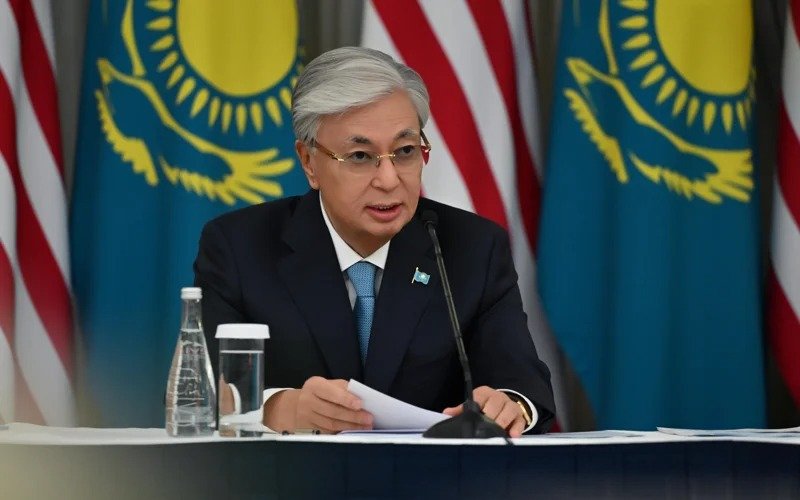
“Selective application of the Charter undermines its authority,” the Head of State stressed.
The President also expressed Kazakhstan’s readiness to host a new dialogue on nuclear disarmament and non-proliferation and called for the implementation of the proposal to establish an International Agency for Biological Security.
“This is one of the key proposals. Kazakhstan has the moral right to voice it. We gave up our nuclear arsenal, closed the Semipalatinsk test site, and hosted the IAEA Low Enriched Uranium Bank. President Tokayev logically said that it is Astana that can become the venue for a new dialogue. At a time when old treaties are collapsing, it is important to stop the degradation of the system,” political scientist Adil Seifullin commented.
As for UN reform, the expert noted the need to return to practical work.
“Our President proposes focusing on conflict prevention, humanitarian corridors, and transparency of decisions. These are concrete steps that can strengthen trust in the Organization. As a country, we are already setting an example: we host negotiations, put forward initiatives on nuclear and food security. Yes, the tasks are difficult, but precisely such countries as Kazakhstan can give the process momentum, because we have no hidden interests and we speak on behalf of the international community,” said A. Seifullin.
Kassym-Jomart Tokayev spoke about the crisis around Ukraine. According to him, territorial disputes are never easy to resolve; they require mutual restraint and responsibility for the sake of future generations.
The Head of State also addressed the situation in Gaza and welcomed the normalization of relations between Azerbaijan and Armenia mediated by the President of the United States.
“This proves that even long-standing conflicts can be resolved through diplomacy and common sense,” Kassym-Jomart Tokayev said.
It must be said that many UN member states today are advocating a “repair” of the UN Security Council. But, unfortunately, there is no consensus. The “reprogramming” of the Organization runs into a crisis of trust, and the veto right becomes a stumbling block on the path to reform.
“UN member states demand fairer representation, and our President speaks about the need to expand the Security Council’s membership. It is necessary to strengthen accountability for the use of the veto right. Kazakhstan takes an active position: we support voluntary restrictions on the veto in humanitarian crises, and greater openness in the Council’s work. These are steps that can already be implemented now, and they would demonstrate that reform is possible,” emphasized A. Seifullin.
Experts are convinced that middle powers can play a unifying and stabilizing role, smoothing sharp edges in the relations of major powers.
“Kazakhstan is among the leaders here. We have a reputation as a neutral platform, mediation experience, and the authority of a country that renounced nuclear weapons. Such states can assist in humanitarian and peacekeeping matters, where great power rivalries hinder solutions. President Tokayev consistently emphasizes that Kazakhstan’s strength lies precisely in dialogue and mediation. This is our real contribution to global stability,” noted the expert.
The UN is evolving gradually. And today the permanent members of the Security Council, blocking certain decisions, are forced to justify their position before the entire international community. Over time, this pressure may have the necessary effect and lead to less frequent use of the veto right.
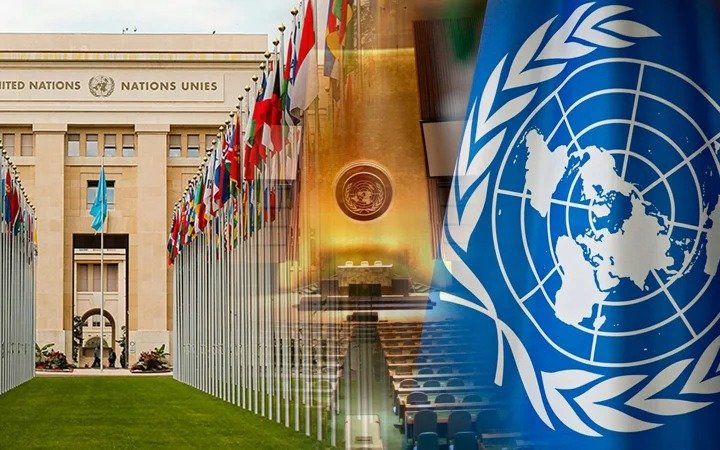
Through politics to economics
The address of the President of Kazakhstan at the UN general debates and his negotiations with American business in New York served one overarching goal — to shape the image of Kazakhstan as a responsible international partner capable of constructive dialogue amid geopolitical polarization.
“We are witnessing growing fragmentation and political bias in investment flows. As a result, the volume of foreign direct investment in the world last year decreased to 1.5 trillion dollars,” Kassym-Jomart Tokayev noted, proposing to build bridges of cooperation against the backdrop of geopolitical divides and sanctions.
And these are not just words. Kazakhstan, using its diplomatic potential, addresses urgent regional problems, in particular, by drawing the attention of the international community to the problems of Afghanistan.
With the support of the UN Secretary-General and partner states, a new UN Regional Center for the Sustainable Development Goals for Central Asia and Afghanistan was opened in Almaty. During the meeting with the UN Secretary-General in New York, a memorandum on its functioning was signed.
If Afghanistan achieves stability, new opportunities will open in the transit and logistics sector. Kazakhstan already today handles 80% of all land transit between Asia and Europe. And these opportunities are expanding.
“By 2029, we plan to build 5,000 kilometers of new railway lines,” the Head of State specified.
Among other most important regional problems are water and food security, as well as the shrinking of the Aral and Caspian seas.
“We call for urgent measures to preserve the water resources of the Caspian Sea together with our regional partners and the entire international community,” the Head of State emphasized in his speech at the general debates, announcing the Regional Environmental Summit in Astana scheduled for April next year.
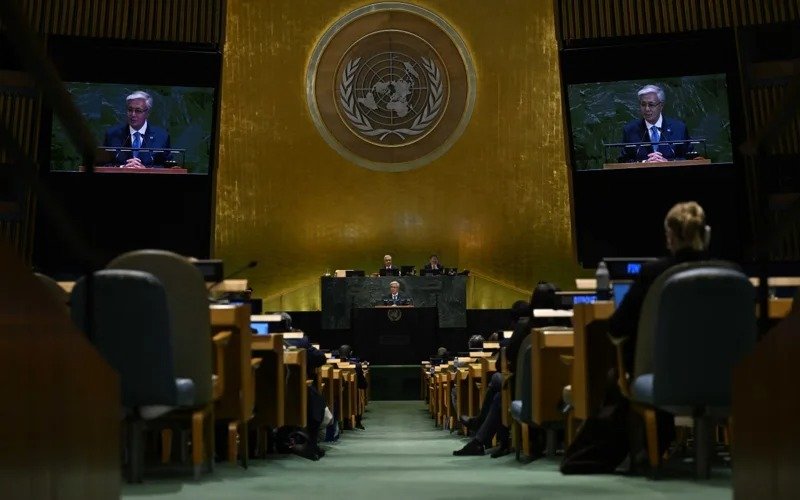
Kassym-Jomart Tokayev also proposed that the General Assembly adopt a resolution proclaiming April 22 as the International Day of Planetary Greening, and touched upon the green agenda and the development of agriculture.
“In Kazakhstan, agriculture is the main consumer of water, accounting for up to two-thirds of total water use. This poses a threat to our food security. That is why the President is drawing attention to this problem. No state is capable of solving it alone. Moreover, these solutions must be as inclusive as possible,” political scientist Tair Nigmanov believes.
According to him, in the second half of the 20th century, the dirtiest segments of production chains were outsourced to Asian and African countries. And now the states that achieved prosperity precisely because of the absence of environmental norms and restrictions are calling for emission reductions and carbon neutrality.
“This, at the very least, does not look entirely fair. The process of greening the global economy must be common, with technology transfer and fair distribution of quotas, not merely reproaches. The issue should not be politicized in order to limit economic competitors,” the expert expressed his view.
From AI to human capital
The topic of artificial intelligence, which became central in the President’s Address this year, gained substantive content in New York.
“Kazakhstan welcomes the establishment of a Global Dialogue on AI Governance under the auspices of the UN. We are ready to actively participate in the work of this platform to ensure security, inclusivity, and human-centeredness in the field of AI,” the Head of State emphasized from the UN podium.

At the High-Level Meeting on China’s global initiatives, he also supported the PRC’s proposal to create a Global Organization for Cooperation in the Field of Artificial Intelligence.
This topic was also one of the priorities at the meeting with U.S. business leaders. The plans are ambitious: Kazakhstan intends, within the next three years, to become the leading IT hub of Eurasia in digital transformation and artificial intelligence.
According to Kassym-Jomart Tokayev, the active involvement in Kazakhstan’s ecosystem of such global technology leaders as Nvidia, Amazon, Starlink, and Microsoft demonstrates the significant potential of the country.
As part of the working visit, Kazakhtelecom and Amazon Kuiper signed a distribution agreement to provide access services to the Kuiper satellite network. The President and Amazon Senior Vice President David Zapolsky discussed prospects for cooperation in digitalization, communications, and artificial intelligence.
Amazon Kuiper plans to deploy its own ground infrastructure in Almaty, Akkol, and Aktau, investing about 200 million dollars.
The Head of State also received Meta Vice President Yann LeCun, a well-known computer scientist specializing in programming and deep machine learning. The conversation focused on the development and application of innovative technologies.
Alongside digitalization, the President named several promising areas of cooperation. These include the energy sector — new opportunities in geological exploration, expansion of uranium mining and processing, and environmentally safe coal-based energy solutions.
“Possessing some of the world’s largest coal reserves, we share the U.S. approach that views it as a reliable and safe energy source, at least in the foreseeable future. Our energy strategy is based on four components: oil, gas, coal, and uranium. And we intend to firmly adhere to this principle,” the Head of State noted.
Among other priorities are attracting investment in the mining sector as well as in transport and logistics. By promoting at the UN the idea of developing transport corridors through Central Asia, Kazakhstan is creating a macroeconomic context for specific business proposals. At the business roundtable, this thesis was immediately put into practice — through an agreement with Wabtec worth more than $4 billion. The documents provide for the production in Kazakhstan of 300 freight locomotives with improved characteristics and their maintenance services.

U.S. President Donald Trump, speaking about the effectiveness of negotiations with Kazakhstan, particularly noted this fact on his page in the social network Truth Social.
A strong emphasis was also placed on the development of the agro-industrial sector.
“To further strengthen our partnership, we propose creating a joint Agro-Innovation Program aimed at developing sustainable agriculture, managing water resources, and digitalizing agriculture,” the Head of State said at the meeting with business leaders.
Developing human capital is no less an important investment in the future. Kazakhstan is becoming a regional academic and research hub. The Head of State called significant the decision of the Smithsonian Institution to establish a Kazakhstan Cultural Heritage Fund, which will preserve, study, and promote globally the rich heritage of our country.
On the sidelines of the forum, a series of meetings with heads of foreign companies took place. The fields of interest are broad: from innovative methods in the nuclear industry (the Canadian company Cameco has already invested more than $500 million in Kazakhstan) to the food industry (PepsiCo plans investments of $368 million).
Overall, the working trip of the President to New York can be called a highly effective example of a comprehensive approach to foreign policy. Strategic initiatives on peace, stability, and reforms were directly converted into trust from the U.S. business community, expressed in specific investment agreements totaling $5.2 billion.
According to Ainur Tukumova, an expert of the International Security Department at KISI under the President of Kazakhstan, in his speeches Kassym-Jomart Tokayev strengthens Kazakhstan’s authority as a state that not only advances its own national interests, but also offers solutions in demand on a global scale.
“This creates additional diplomatic capital and strengthens Kazakhstan’s voice in dialogue both with major powers and with the Global South,” the expert commented.
Ultimately, all this works toward the investment attractiveness of the country. The status of a responsible international partner and an attractive economic platform are two sides of the same coin in Kazakhstan’s policy, a vivid example of effective multi-vectorism that has proven its relevance.
As written before, addressing the 80th session of the UNGA, President Tokayev urged diplomacy over force in Ukraine, Gaza, and beyond.
